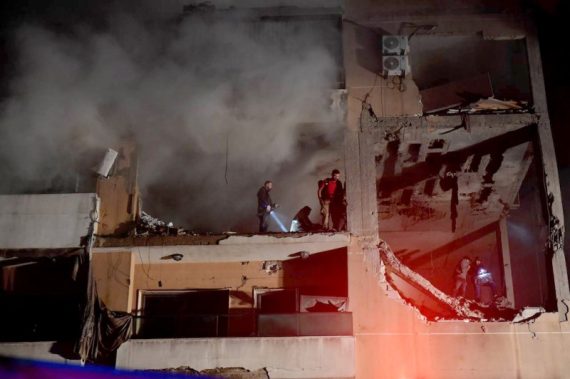I
n a dramatic turn of events, Israel conducted a drone strike in Beirut, assassinating Hamas deputy leader Saleh Arouri. The strike, which took place on Tuesday, has ignited fears of the Gaza conflict spreading beyond the Palestinian enclave.
Arouri, 57, was the first senior Hamas political leader to be assassinated since Israel launched a comprehensive air and ground offensive against the group nearly three months ago. The conflict began with a surprise attack by Hamas into Israeli settlements on October 7, resulting in a devastating war.
Lebanon’s Hezbollah, a key ally of Hamas, has been engaged in near-daily clashes with Israel across Lebanon’s southern border since the Gaza war started. Hezbollah leader Hassan Nasrallah issued a stern warning to Israel against further assassinations on Lebanese soil, promising a “severe reaction.”
Israel has not taken responsibility
Israel neither confirmed nor denied the killing, but Rear Admiral Daniel Hagari, the IDF’s military spokesperson, emphasized Israel’s focus on combating Hamas. Israel has long accused Arouri, a co-founder of Hamas’ military wing, of orchestrating attacks in the Israeli-occupied West Bank.
Arouri played a crucial role in Hamas’ operations in the West Bank, masterminding them from various locations, including Syria, Turkey, Qatar, and finally Lebanon. As the group’s senior official in Lebanon, he strengthened Hamas’ ties with Hezbollah and Iran, the primary backers of both groups.
While Israel’s motivations behind Arouri’s assassination are rooted in its allegations of his involvement in attacks against its citizens, a Hamas official revealed that Arouri was central to negotiations conducted by Qatar and Egypt regarding the Gaza war’s outcome and the release of Hamas-held Israeli hostages.
Iran condemns the killing
Iran condemned the killing. Nasser Kanaani, spokesperson for Iran’s foreign ministry, stated that Arouri’s death would ignite a surge in resistance against “Zionist occupiers” not only in Palestine but also in the broader region.
In response to Arouri’s killing, hundreds of Palestinians took to the streets in the West Bank, condemning the act and chanting slogans seeking revenge. Meanwhile, Houthi rebels in Yemen, backed by Iran, declared their intention to continue attacking shipping in the Red Sea until Israel halts the conflict in Gaza. They also warned of targeting U.S. warships if their group is attacked.
The situation has prompted the U.S. to announce an international maritime task force to protect shipping in the Red Sea, a critical route leading to the Suez Canal, responsible for approximately one-third of global container cargo.
As the Gaza genocide persists, with the latest Gaza health ministry report indicating 207 Palestinians killed in the past 24 hours, the international community faces a challenging humanitarian crisis. Israel has accused Hamas of embedding fighters among civilians, while the targeting of Gaza City’s Al Shifa hospital has raised global concerns.
Recommended
The implications of killing Saleh Arouri
The killing of Saleh Arouri adds another layer of complexity to the ongoing conflict. Hamas’ response to an Egyptian-Qatari ceasefire proposal, delivered by its paramount leader Ismail Haniyeh, remains a critical factor in shaping the trajectory of the conflict. Israel, on its part, has vowed to continue fighting until Hamas is eradicated, leaving the prospect of an independent Palestinian state uncertain.
In Washington, the State Department condemned statements by Israeli cabinet ministers advocating for the resettlement of Palestinians outside of Gaza, calling them “inflammatory and irresponsible.” These statements have fueled concerns about Israel’s long-term intentions regarding the Palestinian territories.
The region now stands at a crossroads, with the assassination of Arouri intensifying tensions and raising the specter of a broader conflict. The international community watches anxiously as the situation unfolds, grappling with the complexities and challenges of mediating a lasting and just resolution to the Gaza crisis.
Source: Reuters





